TO
1 - 25 of 18
| Creator | Title | Description | Subject | Date | ||
|---|---|---|---|---|---|---|
| 1 |
 |
Morgan, Connor | Securitizing Climate Change Examining the Impact of the National Security Frame on Utah Political Elites | The partisan divide over climate change in the United States has led to long-term inaction in creating policies aimed at mitigating and adapting to the changing climate. This study explores one option for bridging the gap: reframing the discussion of climate change to better appeal to those who do n... | 2019 | |
| 2 |
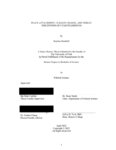 |
Benfield, Kaylara | Place attachment, climate change, and threat perceptions of Utah Wilderness | Place Attachment is the emotional and functional relationships that tie humans to natural environments. It has been shown to impact a person's ability to perceive threats significantly. This study compares the varying levels of Place Attachment with individual knowledge associated with the negative ... | Place attachment; climate change; wilderness; Utah | 2022 |
| 3 |
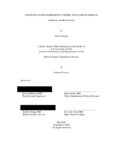 |
Fronberg, Erik | Contextualizing emergency powers and climate crisis in liberal democracies | This thesis develops a theoretical framework for and responds to concerns regarding the use of emergency powers to combat climate change in liberal democracies. Consensus in the scientific community maintains that the window for acting to mitigate the worst effects of climate change is rapidly narro... | 2022 | |
| 4 |
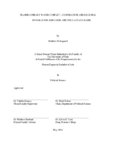 |
Kirkegaard, Matthew | Transboundary water conflict, cooperation, and regional integration: Mercosur and the La Plata Basin | Water politics become diplomatic concerns when watersheds cross international borders. But how do these relationships between states change when the nature of these international borders themselves change through economic and political integration? The purpose of this study is to consider the relati... | MERCOSUR (Organization); Water-supply - South America; Water-supply - Political aspects | 2016-05 |
| 5 |
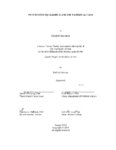 |
Saperstein, Elizabeth | Punctuated equilibrium and the Patriot Act 2001 | An all-encompassing theory to describe the policy-making process in modern political systems has yet to be determined. Therefore, no theory currently exists that uncontestably predicts future policy outcomes. In an attempt to describe the policy process and account for the process as one that fluctu... | Patriot Act (U.S.); Punctuated equilibrium (Evolution) | 2014-08 |
| 6 |
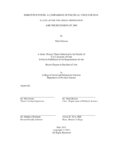 |
McInnis, Tillie | Disruptive power: A comparison of political voice for non-elites after the great depression and the recession of 2008 | This thesis investigates how non-elites influence policymaking in a time of large income and wealth inequality. To do this, I examine the tactics of disruptive power used by two groups following two major economic downturns in the U.S.: the industrial workers after the Great Depression in the 1930s ... | Power (Social sciences); Elite (Social sciences) | 2015-05 |
| 7 |
 |
Dean, Courtney | Food Aid or Industry Subsidy? the Power Dynamics of How the U.S. Feeds the World | In the 1950s the United States passed Public Law 480 and officially took up the cause of international food aid. Today, the United States is the largest provider of food assistance in the world accounting for over 50% of all aid. While other counties have stepped back or shifted their commitments t... | Public law - United States - History | 2016-08 |
| 8 |
 |
Woolf, Katie | There's Something About Syria: Using Foreign Military Intervention in the Syrian Civil War to Assess Predictabilityin International Relations | This paper utilizes three strands of International Relations (IR) theory: realism, constructivism, and leadership theory to inform the actions of the United States and Russia in their intervention in the Syrian Civil War. First, a brief overview of the case is presented along with a review of the th... | 2020 | |
| 9 |
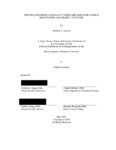 |
Johnson, Nicholas J. | The inflation reducation act's medicare part D drug price negotiation: an unlikely outcome | The Inflation Reduction Act (IRA) was signed into law on August 16, 2022, and the passage of this unassuming piece of legislation marks one of the most important advancements in health care policy in the United States. A key component of the law is its efforts to increase access and affordability of... | Medicare part d; inflation reduction act; drug price negotiation | 2024 |
| 10 |
 |
Li, Danika | Understanding State-Sponsored Violence: Tiananmen Square | The Tiananmen Square Massacre presents an interesting puzzle to political scientists, as it contradicts traditional strategic theory that attacking one's own civilians erodes a government's base of power. The massacre defies these expectations through the ensuing decades of iron control the Communis... | 2018 | |
| 11 |
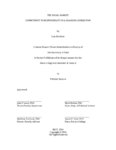 |
Hawkins, Lisa | The social market: Commitment to responsibility in a changing generation | As the partisan divide in U.S. politics grows wider, actionable and proactive policy making becomes more difficult to achieve. To address growing social issues, then, a more flexible and evidence-based approach must be realized. In the last 40 years, the United States has employed varying levels of ... | Public opinion; Social responsibility of business | 2016-05 |
| 12 |
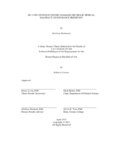 |
Mortensen, Matthew | Do caps on non-economic damages decrease medical malpractice insurance premiums? | This paper examines whether tort reform, like caps on non-economic damages for medical malpractice claims, actually lower insurance premiums for physicians. Proponents of tort reform argue that large jury awards against physicians have driven up physician insurance premiums, and as a result, overall... | Physicians' malpractice insurance - United States; Insurance premiums - United States | 2015-04 |
| 13 |
 |
Pistorius, Jordan | The operational code of presidential candidate Hillary Clinton | Operational code analysis provides key insight into the fundamental views that influence the decision making process. In this paper, I explain the importance of operational code in regard to understanding how important leaders think and in forecasting their behavior in future decision making roles... | Clinton, Hillary Rodham; Presidential candidates - United States; Women presidential | 2016-05 |
| 14 |
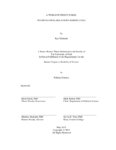 |
Palomaki, Kya | A world without nukes: International relations perspectives | What if nuclear weapons had been neither invented nor discovered? This is the question I take into consideration in this paper. This interesting scenario begs the answer parroted by bloggers and students of politics alike-without nuclear weapons, there would be nothing to stop belligerents from inva... | Security, International; International relations; Nuclear weapons; World politics -- 21st century | 2015-05 |
| 15 |
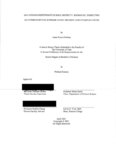 |
Ponce-Orellana, Jenna | San Antonio independent school district V. Rodriguez: dissecting an unprecedented supreme court decision and its implications | This thesis analyzes the Supreme Court Case, San Antonio Independent School District v. Rodriguez (411 U.S. 1, 1972), in which the Court ruled against recognizing a constitutional right to education. The decision in San Antonio broke from precedent and analysis established in other 14th amendment an... | 2021 | |
| 16 |
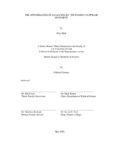 |
Shah, Diya | The appropriation of Sacajawea by the women's suffrage movement | This project examines why Sacajawea was an attractive figure to be resurrected and appropriated during the U.S. suffrage movement, especially in the 1890s to 1920s. To understand the construction and use of Sacajawea, I analyzed about 25 newspaper articles published about Sacajawea in the 1900s and ... | Sacagawea Women -- Political activity -- United States; Women -- Suffrage -- United States | 2015-05 |
| 17 |
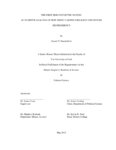 |
Shackelford, Daniel T. | The first servant of the nation : an in-depth analysis of how Jimmy Carter's religion influenced his presidency | Mitt Romney's recent run to become the nation's first Mormon president has made many Americans question what role religion plays in the presidency. While some fervent Romney supporters saw him as man chosen by God for the White House, opponents saw his overt commitment to his religion as a dangerous... | Carter, Jimmy, 1924 - Religion; Christianity and politics - United States - History - 20th century | 2013-05 |
| 18 |
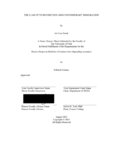 |
Erturk, Ali Cem | The lead up to restriction and contemporary immigration | In the 1840s and 1850s, a nativist viewpoint was applied to all foreigners, particularly Catholics and the Irish. From 1850-1882, it was applied to Asians who were presumed to be of a lower racial and economic order. In the 1920s, the poverty of Eastern European Jews, Italians, Hungarians, and Poles... | 2023 |
1 - 25 of 18
